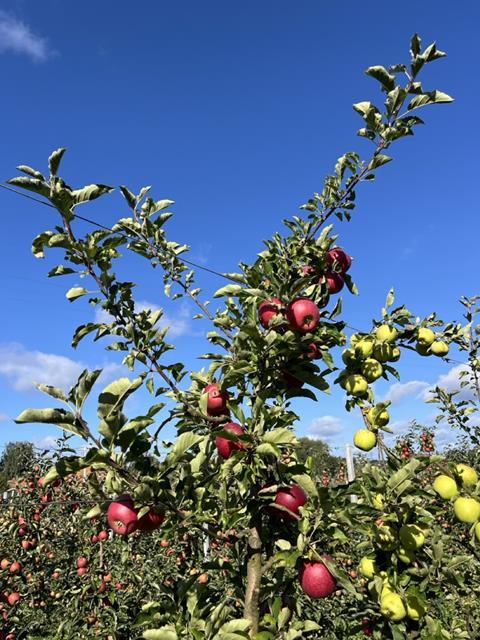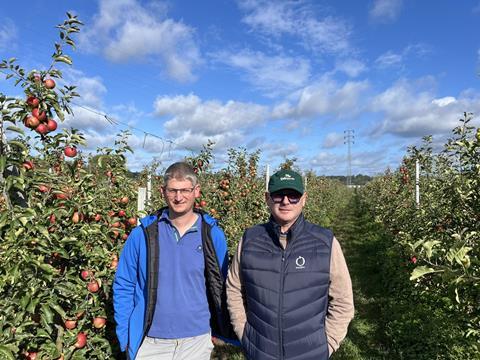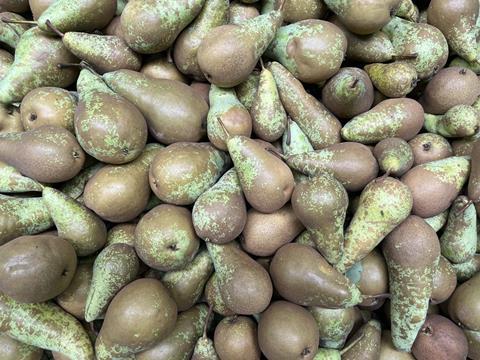After last season’s wet conditions, Belgium’s organic apple and pear producers welcomed this summer’s unusually sunny weather, which is partly responsible for the “incredible quality” of the new harvest

Belgian organic apple and pear growers are enthused this season by the “incredible quality” of the latest crop, both in terms of taste and appearance. BelOrta producer Bert Toetenel, who specialises in organic topfruit – growing nearly all varieties in the cooperative’s organic range on his farm in Diest, situated an hour east of Brussels – puts the result down to the summer’s unusually bright, sunny conditions.
“Last year, due to the rain and the lack of sunlight, there were big scab problems in Golden Delicious, for example,” says Toetenel. “This year, the picking quality of organic Golden Delicious is perfect. Due to the sun, the taste of all our varieties is excellent. Compared with last year, the quality is incredible.”
This year, the biggest challenge for growers has been the lack of rain. “It’s been a warm summer, with almost no rain for three or four months,” says Toetenel. “Thankfully, we have a river at the end of the field which provides ample irrigation. Last year was the opposite, so we’ve had a tricky couple of seasons.”
Organic Conference finds new markets
The BelOrta cooperative boasts a total of 22 organic apple and pear growers, including Toetenel, whose orchard features a mixture of young and older trees, as well as an on-site sorting and packing station.

Most of BelOrta’s organic apples stay in Belgium, according to the cooperative’s Gunther De Vadder. When it comes to pears, however, Belgium is a major player on the export market. “We are the biggest producer of Conference pears in the world,” he says, “but Belgian consumers don’t eat nearly enough of them. So exports are important. The main markets are Germany, Switzerland and Italy. Russia was a big market before the embargo, now it’s China, Brazil, Singapore. Belgian Conference pears are sent all over the world, both in conventional and organic.”
Over the last few years, growth in the organic sector has slowed, especially in Europe, but international markets have continued to grow. “Wherever you see increasing buying power, organics will find a place,” says De Vadder. “So Brazil is now becoming a market for organic, especially in big cities like São Paulo.”
However, the last two years of alternating wet and dry conditions won’t have encouraged too many conventional growers to make the switch to organic any time soon, according to Toetenel.
“We’ve had a difficult couple of years,” he says. “It is getting more and more difficult to protect the plants, with fewer and fewer plant protection solutions available.”
The importance of knowledge
As the plant protection toolkit diminishes, resistance becomes even more crucial. “We have resistant varieties, but no variety is perfect,” says Toetenel. “Also, the old varieties may be less resistant than the newer ones, but grower knowledge is much greater. In the first years, we have to learn a lot about a new variety and do a lot of research. It can take five to ten years for a grower to learn exactly how to handle any problem that can occur with a new variety.”
In addition, over the past three or four years, conventional growers have once again started to earn better returns, according to De Vadder. “The financial push to convert to organic is no longer there,” he says. “We had a big boom ten years ago when conventional growers were getting just 20-25 cents a kilo for Jonagold. But in the last years, it’s been around 75-80 cents. So the economic driver isn’t the same.”
On Toetenel’s farm, the focus is on organic Jonagold apples and Conference pears. “We have organic Greenstar® and Elstar growing alongside Jonagold in the orchards, but that’s mainly to provide a nice mix to encourage biodiversity and pollination,” he says. “When it comes to new varieties, the problem is that you really need to get consumers to try them, otherwise people are generally still happy with the ones they already know.”
“Tastings are a great way of building interest,” adds De Vadder. “I think it’s at the supermarket that the education has to start, by training people working in the fruit and vegetables department so they can talk to consumers and educate and guide them a bit more.”
“The most important thing for consumers is that when they buy this pear or that apple, they know whether it’s sour or sweet,” resumes Toetenel. “When a shopper wants a sour apple, they tend to think of Granny. And unfortunately there isn’t anyone in-store saying, ‘We also have Elstar which is quite sour and has just been harvested this week here in Belgium’. That would certainly have a big impact.”




